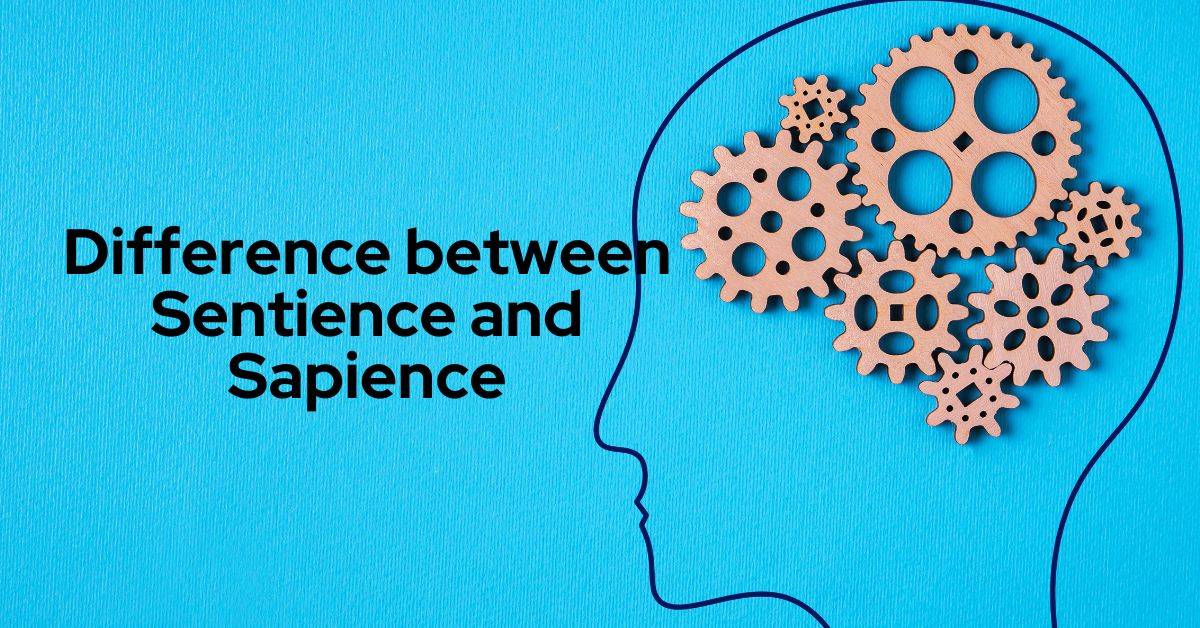What is Sentience?

Sentience is the level of awareness and cognitive state in a living being. A being is recognized as sentient when it starts to have feelings and emotions (both positive and negative). The ability to develop sentience usually happens at a specific stage of life in humans. Sometimes, brain damage can damage those abilities, giving the person a sense of sentience.
Characteristics of sentient beings
A being is sentient if:
- They can express their feelings
- They can feel things through their physical senses
- They respond to sense impressions (aware of certain stimulations such as smell, taste, visual, etc.)
What is Sapience?

Sapience is a brain function that allows a being to apply knowledge, experience, or wisdom.
Scientifically, sapience is a brain function that integrates:
- Emotions
- Social or moral ethics
- Decision making
- Creativity
However, the concept of sapience is far more complex. This is because humans are complicated.
Sometimes you can be happy and think twice before taking action; sometimes, you are just angry and can’t reason. Similarly, sometimes you may be kind, and sometimes you can act rude towards someone.
What we can say of sapience is that it is an ever-evolving mechanism within living beings. It takes account of various aspects of ourselves and forms them into a single entity that sometimes cooperates.
Characteristics of Sapience
- The ability to deduce ideas or meaning
- The ability to understand between right and wrong
- The capability or knowledge or skills to do something
The Nature of Sentience
Based on evidence from several studies, it is concluded that a wide range of animals experiences positive and negative experiences like pain, joy, pleasure, and anxiety.
The discovery of animal sentience can significantly affect how humans interact with animals. That means we as humans have to take an animal’s physical and mental conditions into account. This is important for animal welfare, drafting laws and policies about how people behave with animals.
Not just mammals and birds but many species are categorized as sentient. There was a time when fish were considered non-sentient, but years of research disapprove of the old thought. At the same time, there is an ongoing debate on the sentience of species like decapod crustaceans and cephalopods. However, RSPCA, including many other organizations, already recognize them as sentient and believe appropriate legislation should be passed to protect them. The legislation should ensure these species are not subjected to severe pain and distress. This means chefs must find other cooking methods rather than boiling them alive.
The sentience bill is currently in draft form, but some progress is being made.
Sentience in Artificial Intelligence
AI can become sentient if it achieves an empirical intelligence that enables it to feel emotions and have a conscience like humans.
The concept of sentient AI went viral when Google announced its first sentient AI, “LaMDA,” short for “Language Model for Dialogue Applications.” It is a chatbot that draws similarities with GPT-3 and BERT. Google claims that LaMDA comes integrated with trillions of words from the internet, and it can form sensible sentences and have open-ended conversations with users.
According to a 2022 report, the chatbot uses sophisticated language models that can take on different personalities. It can process millions of articles in seconds and come with authentic information and human-like discussions. LaMDA can show fear of being switched off or be conscious of death due to its personality-adaptation techniques. However, it is far from being a sentient AI.
The Essence of Sapience
Sapience is a behavioral and psychological construct that gives a glimpse of how humans make hard choices in life based on their wisdom and intelligence. However, wisdom is a trait that one can achieve only through aging. To implement wisdom, one needs to live longer and aggregate the combined knowledge one gained over a period.
Some believe sapience has an inherent capability to manifest wisdom, similar to how intelligence attracts knowledge. Whether a person can obtain sapience is based on several factors. One such factor is how they utilize their intelligence in real life. For example, if an intelligent person spends their whole life in a non-stimulating environment, they would never develop wisdom or sapience.
Sentience vs. Sapience: Key Distinctions
| Factors | Sentient | Sapient |
| Definition | It is a type of intelligence related to emotions, feelings and sensations. | It is an intelligence which comes from knowledge, wisdom, exposure and education. |
| Effects on education | How you feel about something or someone has little to no impact on your intelligence or education. | Sapience is deeply impacted by your education and experience you have received in your life. |
| Impact on Exposure | Your emotions are minimally affected by your exposure. For example, you can feel your presence or aliveness even within your room. | Exposure plays a significant role in sapience. |
| Effects on emotion | It depends on the type of emotion and the environment and culture. | Sapience is less affected by emotions. |
| Reasoning ability | Dependent on emotions and sensations | It depends on wisdom, experience and knowledge. |
In summary, both Sentience and Sapient are a kind of intelligence. Sentience revolves more around emotions, while sapience comprises wisdom and intelligence. Both can be judged on reasoning, judgment, decision-making, and relationship-building. In sapience, factors like education, exposure, and experience play a crucial role; whole emotions and personal values are essential in Sentience.
Frequently Asked Questions (FAQs)
Can an AI system be considered sentient?
The core values of Sentience revolve around consciousness (self-awareness) and the ability to express and show emotions. Although some AI can emulate human-like behavior and may even generate an emotional response to specific queries, they cannot be considered sentient. This is because the answers or responses of AIs are programmed through patterns and rules rather than genuine emotions or consciousness.
Are all animals sentient?
The primary school of thought was that humans are the only sentient being on the planet. Soon, more animals start to get added to the list. This includes vertebrates or creatures with spines, especially dogs, parrots, cows, pigs, and other domestic animals who can form companionship. Some studies also consider non-vertebrate animals, such as octopuses, squid, crayfish, crabs, etc., as sentient.
Can a being be sapient without being sentient?
Yes, it is possible for a being to exhibit advanced reasoning and cognitive skills without showing any form of sapience. The most prominent example is Artificial Intelligence.
Reference:
- lesswrong.com/posts/FhjwbQ3RfYeC6ZJWe/sentience-sapience-consciousness-and-self-awareness-defining
- faculty.washington.edu/gmobus/TheoryOfSapience/SapienceExplained/5.evolutionOfSapience/evolutionOfSapience.html
- science.rspca.org.uk/sciencegroup/sentience#:~:text=Evidence%20from%20multiple%20scientific%20studies,that%20matter%20to%20the%20individual.
- sciencedirect.com/topics/neuroscience/sentience#:~:text=Sentience%20means%20having%20the%20capacity,wide%20range%20of%20nonhuman%20animals.





